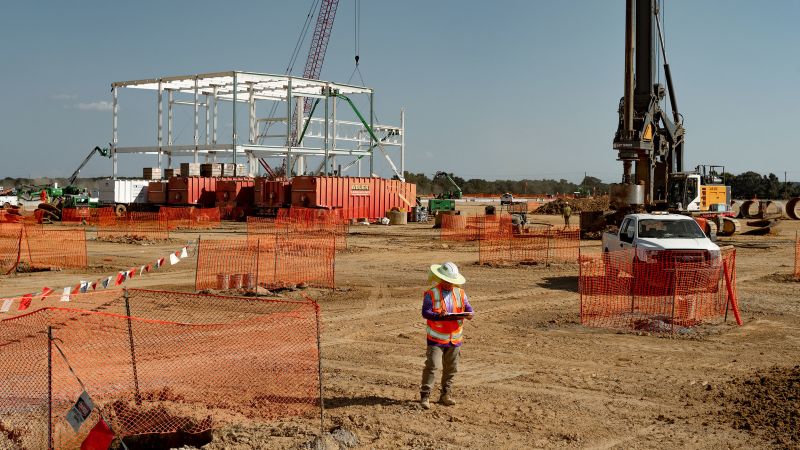Republican Rep. Joe Wilson believes former President Joe Biden’s landmark climate law was “fraud.” He dislikes the tax credits it created for solar power and electric vehicles.
He’s not opposed to clean energy, he said, he’s just not interested in taxpayers funding it. But he is proud of the development of a Scout Motors electric vehicle factory and the 4,000 jobs it stands to create in his South Carolina district. The project, under construction about 15 miles north of Columbia, is relying at least in part on funding from the climate law, but Wilson thinks they’d move forward with the venture even if Republicans carry out Trump’s desire to kill the clean energy credits in an upcoming budget vote .

“I have not discussed this with (the company), but it would be my view from my visit there and understanding of what they’re doing, I think they’re so professional, they can handle it on their own without government subsidy,” Wilson told CNN. “Scout Motors is here to stay,” a spokesperson said in a statement. “With that said, the tax incentives that help companies who choose to manufacture great products here in the United States are important for our business.
Repealing these tax incentives could have a significantly negative impact on American innovation, American job creation, and the growth of Scout Motors.” Wilson’s position reflects the battle brewing between Congressional Republicans: Some vocally defend Biden’s tax credits because they’re bringing billions of dollars of investment and thousands of jobs to their districts; others want fulfill Trump’s promise to terminate the law. Nearly 80% of the investments sparked by the climate law has been in Republican congressional districts, according to data from the nonpartisan think tank Rhodium Group and the Massachusetts Institute of Technology.
Republicans represent 14 of the top 20 congressional districts that are set to gain the most jobs. Tennessee, Georgia and the Carolinas have gained most of the new jobs in electric vehicle and battery manufacturing, said Trevor Houser, a partner at Rhodium Group. Unlike Wilson, experts and business leaders aren’t bullish the clean-energy ventures can stand on their own.
“We’ll see a huge number that get canceled” if the tax credits are killed, Houser said. “It’s hard to predict exactly which facilities will get canceled, but a bunch of them will.” That could devastate Republican voters.
“The worst thing that can happen is these factories get built, open, and either leave a ton of expected growth (and) jobs on the table — or they close entirely,” said Albert Gore, the executive director of EV trade group the Zero Emission Transportation Association. “That’s a terrible outcome for these districts.” Republican infighting is on the verge of spilling into public view as Congress inches closer to its massive budget proposal, after House Republicans cleared a key procedural hurdle on Thursday.
Now the hard work of filling in the budget blueprint while simultaneously making significant spending cuts begins, which is where the fate of the energy tax credits will be determined. Trump has vowed to “terminate” Biden’s clean energy law, dubbing it the “Green New Scam,” and his administration has attempted to halt several federal grant programs created by the law with varying amounts of success. But it will take an act of Congress to reverse the tax credits that have spurred the investment and jobs in mostly Republican districts.
No Republican lawmakers voted for the climate and tax law when it passed in summer 2022, opposing the climate measures as well as unrelated programs that boosted the number of IRS agents to collect tax revenue. Now, many House Republicans acknowledge the vital economic role clean-energy tax credits are playing in their districts. Rep.
Mark Amodei, whose Nevada district is poised to gain more than 20,000 jobs in mining, refining and processing lithium for EVs and batteries, told CNN that continuing to fund these facilities in his district is “fundamental.” A bill that doesn’t include these tax credits would be a red line for him, he said. “This makes good economic development sense, tariff policy sense and trade sense,” said Amodei, who recently met with lithium business leaders in his district.
“If you don’t have lithium production, it’s like, ‘I’m going to see the baseball game, but we don’t have a stadium.’” Buddy Carter’s district in Georgia is home to a Hyundai electric-vehicle factory that could add more than 8,000 jobs, depending on outstanding funding from IRA tax credits. Carter thinks Republicans “should take a scalpel to (the clean energy law), and not a sledgehammer.
” It’s unclear which tax credits he would propose cutting and which he would keep. Carter told CNN the response he has received across the party, including from House Speaker Mike Johnson, has been “mixed.” House GOP lawmakers who want to keep the tax credits told CNN they have been doing outreach on the issue for months, which has included letters to House GOP leadership, educating members with specific examples of how their districts have benefited and conversations with the Trump administration.
“This is something that I’ve been talking about for well over a year,” said Rep. Mariannette Miller-Meeks of Iowa, who chairs the Conservative Climate Caucus. The Trump administration’s aggressive tariff push has shined a brighter spotlight on the case for the continuation of IRA tax credits.
“Especially now with all the tariffs and the interest in trying to bring manufacturing back to the US, you can’t have that manufacturing if you don’t have energy and you can’t run the plant,” said New York Rep. Andrew Garbarino, who led 21 Republicans in a letter to the House Ways and Means Committee last month calling for the tax credits to be preserved. Garbarino said there is a “need” for energy from renewables like wind and solar to keep projects powered.
“It takes 10 years to build a natural gas plant,” he added. Rep. Darin LaHood of Illinois, whose district stands to gain nearly 13,000 jobs from projects including a re-opened Stellantis EV assembly plant as a result of IRA tax credits, acknowledged to CNN that there was a “bullseye” on the legislation since it was not initially passed with bipartisan support.
LaHood, who sits on the Ways and Means panel, told CNN the task for Republicans will be figuring out how to not pull the rug out from under businesses that have been counting on and planning around these federal dollars. “These tax credits are not going to last in perpetuity or until the end of their life currently in the bill. But let’s figure out what’s the appropriate sweet spot for a reasonable ramp down” LaHood said, emphasizing that approach will vary by sector.
Meanwhile, Rep. Randy Weber, who represents a swath of coastal Texas southeast of Houston, is not worried if his district loses over 10,000 jobs related to offshore wind manufacturing and carbon capture that IRA tax credits would bring. “If we have to give a little, we’ll give a little,” Weber told CNN.
“You’re talking about jobs, but you’re also talking about things that people have disagreement on. Not everybody is for offshore wind. I wish I could tell you they are.
” In Tennessee, Ford is building a massive EV and battery factory in Rep. David Kustoff’s district, which is part of the reason it stands to gain as many as 18,000 jobs — the most in the nation — from Biden’s tax credits. Kustoff says the businesses he represents “have made investments where they’ve relied on what was passed in the Inflation Reduction Act.
” But, deep in conversations with his fellow Ways and Means Committee members, Kustoff has a less-than-reassuring message to send back home. “Stay tuned.”.
Environment

Republicans may be poised to kill tens of thousands of jobs in districts that voted for Trump
















